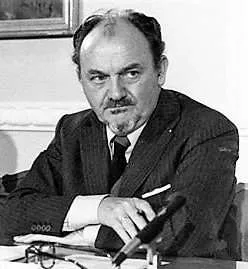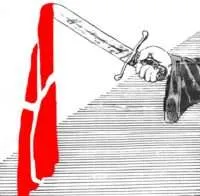Appeals to the Supreme Court – What Appeals?
On several occasions, including on the 15th August 1983, Judge Brink told the court, the defence and the accused that the permission of the Ministry of Justice was not required in order to appeal decisions by the court to the Supreme Court.
Judge Brink was very clear about this and it was also totally clear to the defence and me that such application to the Ministry was not required; otherwise, judge Brink would not state this in the court. Therefore, neither the defence nor I made such application to the Ministry of Justice with regards to the decisions made by the High Court on the 15th August and to Judge Brink’s pre-judicial behaviour and biased actions.
Judge Brink lied and this lie, in effect, resulted in that the Supreme Court simply later dismissed the appeals on the grounds that the Ministry of Justice had not granted permission for such appeals.
In other words, due to judge Brink as the head of the High Court trial and his statement to the defence and the accused (that no permission for appeal was required from the Ministry of Justice), the appeals were ignored by the Supreme Court and never heard.
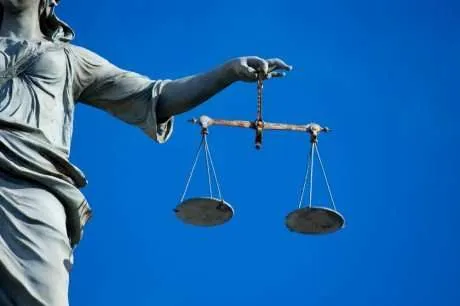 The Danish Ministry of Justice – Geoffrey Robertson QC, told the judges at the European Court of Human Rights that the Danish Ministry of Justice was like a large Octopus with its tentacles everywhere.
The Danish Ministry of Justice – Geoffrey Robertson QC, told the judges at the European Court of Human Rights that the Danish Ministry of Justice was like a large Octopus with its tentacles everywhere.
Advocate Ernest Hartwig wrote in 1978 in the Danish Weekly Transcript of Law, that the Ministry of Justice was totally and exclusively in control of all decisions of appeals to the supreme court. He provided some facts to show this over a 3-year period, the prosecution had applied 90 times and granted 89 appeals, where the defence had appealed 357 times and granted only 52 times (or 14%).
So interestingly, at the time there was less than a 15% chance that you would be granted an appeal to the Supreme Court, if the application came from the defence, whereas a near 100% chance if it came from the prosecution. The most ridiculous state of affairs, that the prosecution (the Ministry of Justice” had to ask the Ministry of Justice to grant them permission to appeal a case to the Supreme Court. One hand had to ask the other hand of the same body?
My Continued Pre-Trial Incarceration Effectively Used as Blackmail
Until late 1983, neither the Special Prosecution nor the High Court specified the grounds as to keeping me incarcerated in pre-trial detention month after month.

These offers put forward in the spring of 1983 with regards to me being released if I withdrew the appeal to the High Court. That such offers were made can be confirmed from the letter to the Ministry of Justice from advocate Folmer Reindel, dated 26th October 1983.
All of the judiciary judges at least knew that such an offer had been made to my defence (more than six months earlier) if I would refrain from appealing the Lower Court’s judgment. Moreover, I had shortly, prior to the High Court trial, served a sentence of more than seven years. Therefore keeping me in restrictive pre-trial incarceration during the High Court trial must be considered blackmail and indeed it impeded my ability and rights to defend myself.
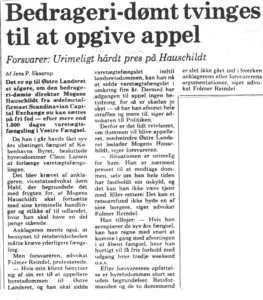
The Prejudicial Publicity Continued
For the 55th time: No, you do not get permission to get free, Hauschildt
This was the tabloid headline more than six months after I had received an offer to get free if I just dropped my appeal.
At the same time, the Prosecution argued in the tabloid media that if I became free me would run away from Denmark – not telling the media that they more than six months earlier had offered me to go free – if I dropped my appeal to the High Court.
The tabloid newspaper even argued that if five out of six judges had decided to keep me in pre-trial detention after nearly four years – they had given a good indication that I will receive a sentence beyond seven years.
To make matters even worse, to a certain extent my continued incarceration put pressure on the lay-judges with regards to finding me guilty and indeed, the sentencing, as I already had served more than an eight-year sentence by the end of the High Court trial.
Shortly after the High Court trial had commenced, my defence protested again to the Danish Press Council with regards to various newspaper articles by BT. These articles were most prejudicial and played a major role in how the public viewed my case and ultimately had a considerable impact on many people including the lay-judges.
Advocate Folmer Reindel witnessed this very critical behaviour by some of the High Court judges himself as they were speaking to the journalist from the BT newspaper whilst sitting at the same table in the cafeteria of the High Court openly discussing my case.
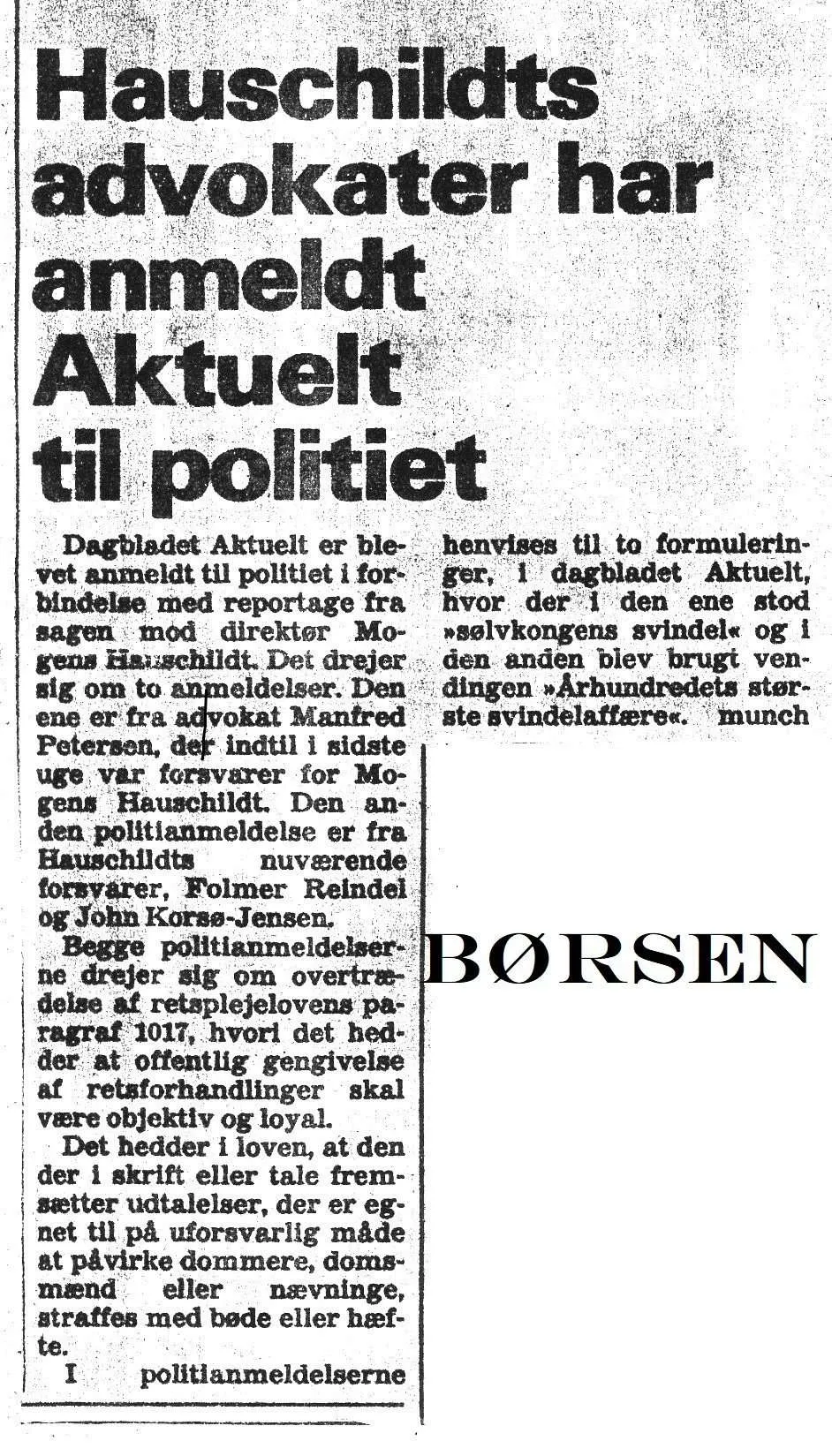
This journalist was subject to the complaint to the Press Council from my defence lawyers since he had published articles which had contained many false and incorrect statements, lies, and innuendoes which all portrayed serious prejudice which could improperly influence the lay-judges and indeed the public. We always considered this journalist to be an instrument of the Special Prosecution.
Hauschildt’s defence complain to the Minister of Justice
The huge amount of adverse press and television publicity before and during the trial – with a one-sided influence from the Special Prosecution and the Authorities – should be seen in relation to the size of Denmark; no doubt the court was swayed by such an extensive press campaign.
Even the Danish reporters lied by inference and omission without any accountability in 1980. Even well-intentioned news publications go into a state of high dudgeon and defend their reporters’ dubious behaviour on the premise of newsroom morale and press independence.
Advocate Folmer Reindel told the European Court of Human Rights in Strasbourg – 26th September 1988:
“It is clear that the Danish authorities had, for a long time, the objective to close down Hauschildt’s successful and profitable business, irrespective that the companies acted correctly and within the Danish law. From the first day of the action against Hauschildt and his companies, it has been the objective of the Danish authorities to justify their illegal acts at any cost, including keeping Hauschildt in solitary confinement and pre-trial detention for more than four years as a hostage to justice. The Danish authorities acted within total contempt for the Danish law and justice and the European Human Rights Convention. Hauschildt and his companies became victims of the Danish States ”
Danish publishers, like many others around the world, have power without responsibility. In my case, practically all journalists produced a one-sided traduced, misquoted, libelled report and held me up to unjustified ridicule.
The defence’s legitimate views were totally ignored by the media. To make matters worse, it was clear that the gutter press (with their large circulation) colluded with the Special Prosecution in fabricating lies and prejudicial acts.
Unfortunately, those with the monopolies as well as the few publishers who dominated the Danish media had no interest in correcting their mistake – which exposed their biases and the carelessness of their reporters at the time. Appeals to the Supreme Court – what appeals?
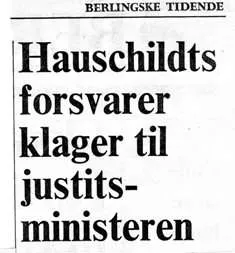
Even the more responsible media the financial media made “fun” of my defence lawyers complaint to the Ministry of Justice as to the Social Democratic owned newspaper Aktuelt outrageous lies and headlines, acting as the official propaganda ministry for the governments.
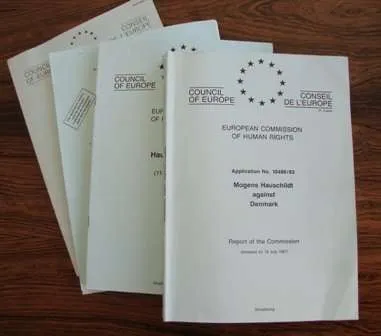
HAUSCHILDT v. DENMARK
The European Commission and the Court of Human Rights Judgement, Comments and Reports 1982-89

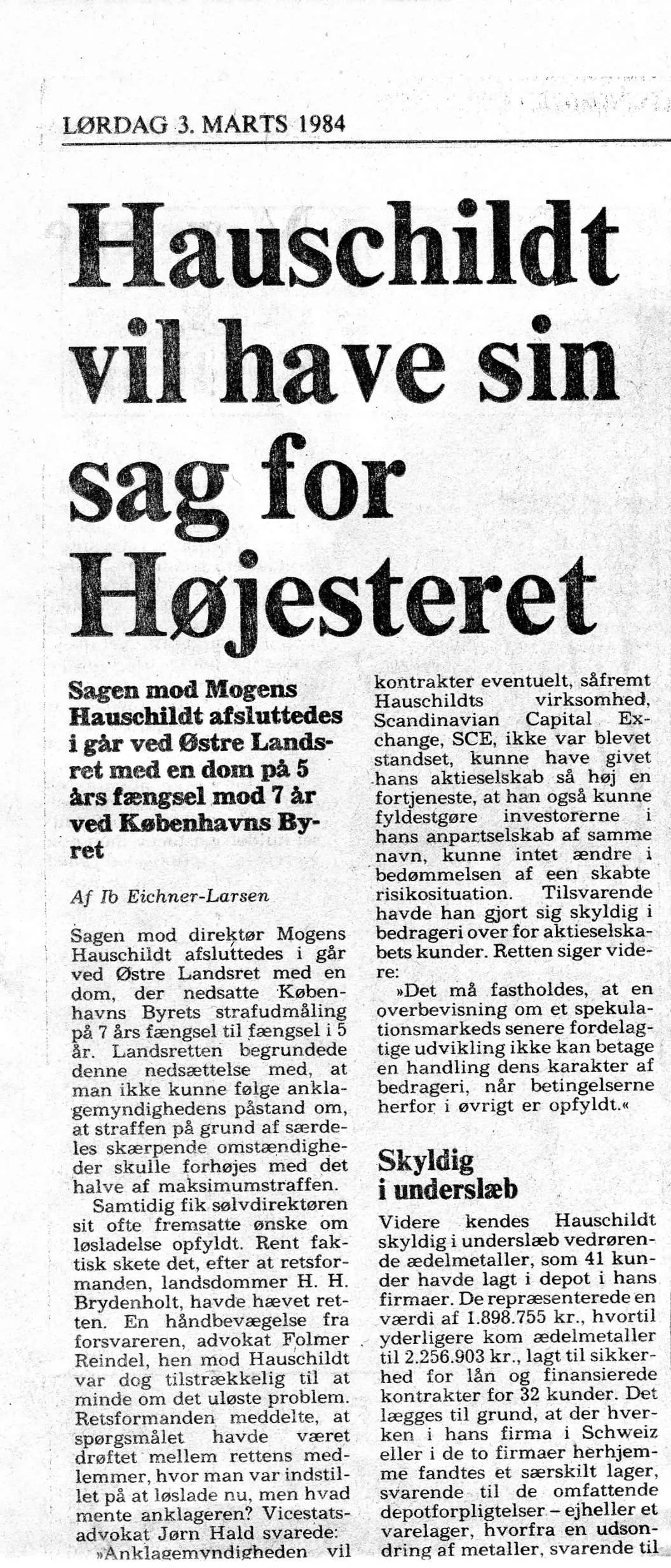
JUSTITSLIG
Although that I have shaken hands and been in the company of kings, queens, presidents, prime ministers, princes and princesses, Nobel price laureates, ambassadors and captains of finance and industry, during the last 42 years I never found myself again after the terrible events in Denmark, I am not who I was, I have lived as a changed person marked by the scars which the Danish State inflicted on my family and me.
I did leave my isolation cell, but the solitary isolation has never left me!
The Rigged Danish Justice System
Yes, the Danish justice system was rigged before my win and judgement against Denmark at the European Court of Human Rights in 1989.
Yes, it was rigged by political prosecutions like mine. Yes, it was rigged because the Ministry of Justice was in charge of the police, prosecution, the appointment of the judges, the courts and prisons.
Even the former Minister of Justice for seven years and longest-serving member of the Danish Parliament, Erik Ninn-Hansen confirmed that the judges in Denmark were not independent – but under the dictatorship of the Ministry - he should know!
Rigged definition in most dictionaries: - manipulated or controlled by deceptive or dishonest means
Rigged is defined as something that is fixed in a dishonest way to guarantee the desired outcome.

